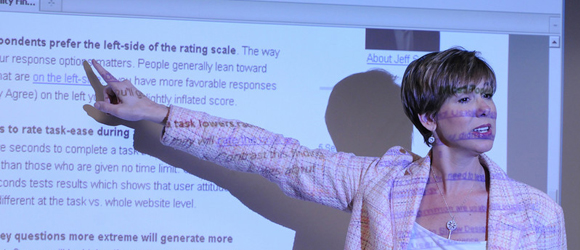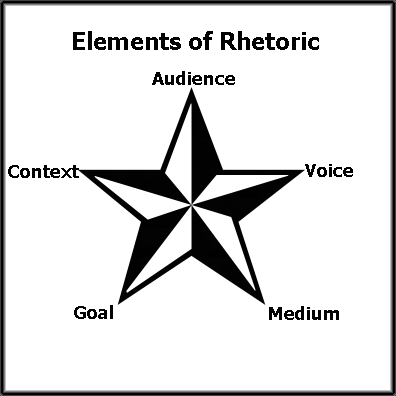Looking for a new way to foster discussion in your classroom? Try this sticky note exercise! This highly adaptable exercise allows for meaningful discussion, while the anonymity of it allows students the freedom to express their ideas. Try using this method to discuss writing in your classroom, and see what new revelations your students come to.
Tag: pedagogy
Cameron Carter is the Communications & Marketing Specialist for the Office of Distance Education at George Mason University. She earned her MA in English (Professional Writing & Rhetoric) from Mason in 2013, and she is currently a graduate student in the Higher Education Administration certificate program. You can reach her at [email protected].
Over the past five years, Mason’s Office of Distance Education (DE) has supported a number of faculty and programs transitioning their courses from face-to-face to fully online. From partnering each faculty member with an Instructional Designer in Learning Support Services (LSS) to connecting them to the accessibility experts with the Assistive Technology Initiative, highlighting the research and copyright expertise of the University Librarians to emphasizing the resources available through the Center for Teaching and Faculty Excellence (CTFE), our role has focused largely on how best to connect Mason’s online faculty with the services and resources available across our campus.
As the DE Office, along with online education at Mason, continues to grow and take shape, we’ve asked ourselves – is this enough? This question has sparked a new effort for faculty support from the DE Office, mainly via an upsurge of faculty development opportunities. We don’t only want to support online program development and link to specific resources. We want to promote a sense of faculty community and a culture of shared knowledge and practice. Through a string of faculty development events hosted in collaboration with CTFE and LSS, we are making a push to inspire this shared place for faculty at Mason. Here’s the kicker – we aren’t focusing on online faculty alone.
Alisa Russell is a Master’s student in the Teaching Writing and Literature program at George Mason University. She works as an administrator in the Writing Center, a research assistant for Writing Across the Curriculum, and a teaching assistant for First Year Composition. Her current research interests include the Writing About Writing movement in composition theory/pedagogy and Writing Center training and strategies for working with multilingual writers. You can reach her at [email protected].
Whenever we assign writing assignments in our classrooms, we often peripherally acknowledge that the Writing Center is a viable option for our students to work with a tutor toward improvement. However, students may not fully understand the extensive options that the Writing Center provides for them. After scrambling for an appointment or not making one at all, the student may bring in a near-final draft for a quick check mere hours before the due date, which fosters little learning and room for growth. Instead, as the instructor and grader of your students’ work, you can steer your students toward when and how they should be using the Writing Center even more convincingly than our website or bulletin boards. Teaching your students when and how to use the Writing Center will not only provide more opportunities for your students to engage in transferable learning, but it will also lead to more fully developed and reviewed writing assignments.
by: Mikal Cardine
Mikal is a senior studying English at George Mason. She previously worked with WAC to create disciplinary writing guides for student use. To reach her, please contact [email protected].
The average undergraduate will hear a variety of conflicting viewpoints from their university professors on the topic of Wikipedia. While some professors will openly express distrust of Wikipedia as a source for research, others are more open to the use of Wikipedia as a learning tool. While Middlebury College outright banned undergraduates from citing Wikipedia in any academic essay—stating that “students need to be taught to go for quality information, not just convenience” (Jaschik, 2)—professors such as Mark Kissling argue that faculty do a disservice to their students if they don’t help them to understand why instructors are concerned about the source. As Kissling writes, professors have a duty to teach “their students to learn to critically read Wikipedia…helping them understand how it is created, how it defines and positions knowledge, and what it makes possible and fails to do” (Kissling, 1).
As an undergraduate, I have to admit that Wikipedia is in. Originally branded as untrustworthy, the site is now our go-to research tool – but why? Has student scholarship fallen so far? Or has Wikipedia possibly become a useful research tool? Prompted to learn more, I decided to do a little research and created a simple survey to determine Wikipedia’s current value to both professors and students.
by: Caitlin Holmes
Caitlin Holmes is the Assistant Director of Writing Across the Curriculum at George Mason University. She blogs regularly about teaching here at thewritingcampus.com. You can reach her via email at [email protected].
During a pre-semester meeting to discuss the QEP assessment findings of Mason’s English 302 Students-as-Scholars Program, instructors of our Advanced Composition courses went over the primary student learning outcomes (SLO):
- SLO-1, Discovery: Understand how they can engage in the practice of scholarship at GMU
- SLO-2, Discovery: Understand research methods used in a discipline
- SLO-3, Discovery: Understand how knowledge is transmitted within a discipline, across disciplines, and to the public
- SLO-4, Inquiry: Articulate and refine a question
- SLO-5, Inquiry: Follow ethical principles
- SLO-6, Inquiry: Situate the scholarly inquiry [and inquiry process] within a broader context
- SLO-7, Inquiry: Apply appropriate scholarly conventions during scholarly inquiry/reporting
What those discussions reinforced for my colleagues and me is that engagement in scholarship and knowledge transmission requires that students have advanced reading practices that often are not overtly discussed – or are sometimes presumed as proficiencies – as we work on writing competencies.




